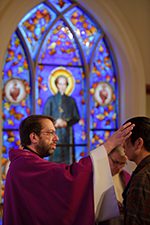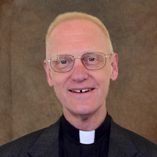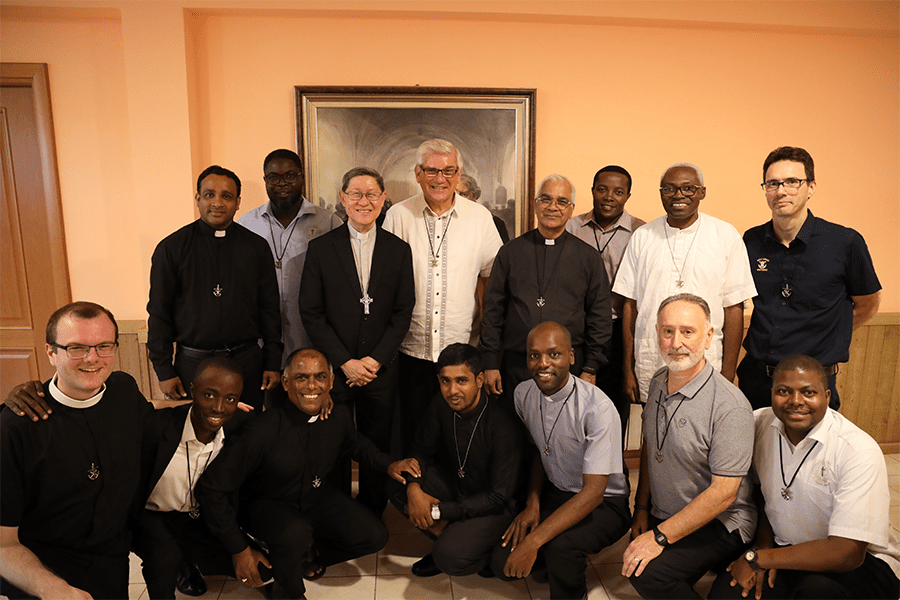It has long been called “The Ash Wednesday Phenomenon.” This title refers to the fact that, even though no one is “obligated” to come to church on this day, more Catholics attend services on Ash Wednesday than on any other day in the Church calendar – with the possible exceptions of Christmas and Easter. Explanations for this phenomenon generally range from the jocular and cynical (“It’s the only day you get something free!”), to the tired and hackneyed (“It’s the last bastion of Catholic guilt!”).
This year I finally heard a statement which I believe hints at the real motivation behind this phenomenon. It came in a very different context. A member of an adult education class on the gospels, when asked to compose a one sentence summary of the Good News, wrote simply, “You belong.” Whether or not this is an adequate summary of the Good News, it certainly speaks to the heart of Ash Wednesday. For, despite all my fears to the contrary, despite all those subconscious messages that only good people should be in church, despite all those vague stirrings of insecurity, guilt, and self-doubt that always seem to be rumbling around deep inside of me, somehow Ash Wednesday has succeeded in communicating the message that “you are still loved,” “grace will always be bigger than your sin,” “this is your home.” Together with all people who make up the Church, Ash Wednesday allows each of us to say as Pope Francis said of himself, that my basic identity is that I am a sinner who has been looked upon by Christ. Yes.
In his Apostolic Exhortation, “Evangelii Gaudium” (“The Joy of the Gospel”) Pope Francis talks about what happens when we encounter this loving look of Jesus. It leads us to the conviction that “no one can strip us of the dignity bestowed on us by this boundless and unfailing love,” (EG 3) and assures us that “God never tires of forgiving us.” It is this unshakable conviction, rather than some passing emotion, which constitutes the true joy of the Gospel. As Francis goes on to say: “Joy adapts and changes, but it always endures, even as a flicker of light born of our personal certainty that, when everything is said and done, we are infinitely loved.” (EG 6)
Paradoxically, it is this very joy that beckons us, in fact compels us, to come into a real and appropriate sorrow for sin. For, if my true identity comes from a realization of being infinitely loved, then it becomes almost immediately apparent, if I have any kind of awareness at all, that there are many things in my life that keep me from fully receiving this transforming love, and thus from being who I really am. Just as real joy is not so much an emotion as a conviction, so also is genuine sorrow for sin. Sorrow for sin is the conviction that I need to choose to rid myself of what is not me, what is sin, so that I may be who I truly am. Yes, I need to repent of sin because sin “offends” God; but this is because sin prevents the love, the life, of God from coming to wholeness in me. So I need to do “penance” — that dreaded word that causes me to have a love/hate relationship with Lent. Yes, penance is hard (surprise, surprise); but it is not undertaken for the sake of trying to appease an angry God who likes to see me suffer. Rather, it is a discipline which strengthens my will for choosing the good, i.e. choosing God. Thus, the three traditional and powerful Lenten practices (prayer, fasting and almsgiving) become a matter of choosing to empty myself of some things that are themselves good (food, resources, time) in order to be nourished with the greater good of God’s own life, for the building up of both myself and my neighbor.

This being the case, I have found myself in recent years growing in appreciation for the older formula recited when the ashes are being applied to my forehead: “Remember you are dust, and unto dust you shall return.” In my early years, this sounded ominous and frightening, a warning that I could die at any moment, and I had better shape up so that I could escape a harsh judgment. It now sounds more like a reminder that in creating me God formed me from the earth and blew Spirit/life into me; and this same loving God wants today to form me anew, from these ashes, into the divine likeness.
Have a blessed, joyful, sorrowful Ash Wednesday. For, you belong!

Fr. Donald Dilg, C.S.C., currently serves as the Assistant Novice Master at the Holy Cross Novitiate in Cascade, Colorado. As an undergraduate at Notre Dame, Fr. Don studied Speech and Drama. He has served at several parishes and has worked in high school campus ministry. He was ordained in 1975.



